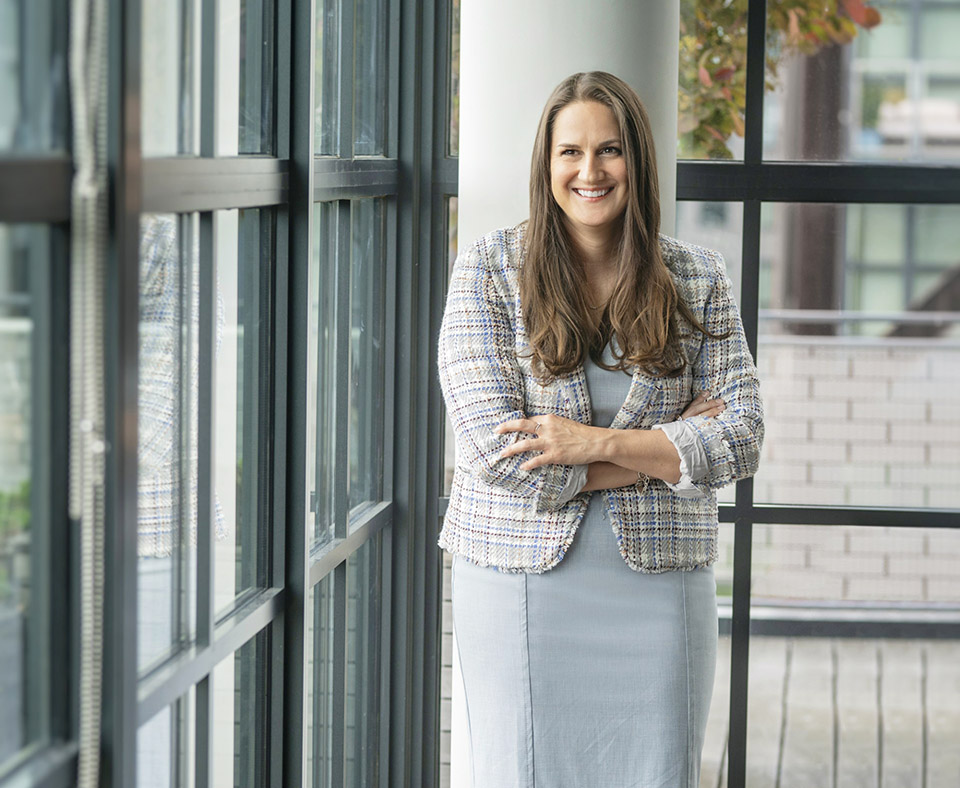Janae Brady’s farm roots inform every decision she makes.
Janae Brady traces her agricultural roots to the vast, open Kansas wheat fields. From these beginnings on her family’s farm, Brady has grown into a pivotal figure in agricultural advocacy, currently serving as vice president of government affairs for the American Seed Trade Association (ASTA). Her journey from farm to the forefront of agricultural policy in Washington D.C. reflects her deep connection to her roots and her desire to be a dynamic influence on the seed industry.
Brady’s agricultural background is the foundation of her professional aspirations. Her family mainly grows wheat and sorghum in an area of the country she describes as a “deep red space” on the U.S. Drought Monitor that rarely gets the water it needs. Learning to work through the uncertainty and challenges of farming helped prepare her for future adversities in the world of politics.
“I am a farm kid,” she states. “I grew up on a working family farm that’s still in operation. It’s absolutely in my roots. I try to stay informed about how the farm is doing — if they are getting rain, and how the crops are looking. It informs what I do in my career at every level.”
Brady said her time on the farm gave her an intrinsic understanding of the agriculture and seed industries’ challenges and opportunities. This connection guided her early career decisions and continues to influence her approach to advocacy and policy.
Attending Kansas State University, Brady majored in education and then served as a teacher for three years in the Wichita, Kansas Public School system before earning a master’s degree from The George Washington University.
From Capitol Hill to ASTA
Brady’s transition to the political arena began on Capitol Hill, where she worked for Chairman Pat Roberts (R-Kansas) on the United States Senate Committee on Agriculture, Nutrition and Forestry during his time as chairman and ranking member. As senior professional staff, Brady advised the chairman on policy issues concerning international trade, agricultural research, biotechnology, crop protection and agricultural defense. In that role, she honed her skills in policymaking, focusing on agricultural research and trade legislation during critical negotiations for the 2018 Farm Bill.
“My first real exposure [to the seed industry] was working with the government affairs team at ASTA while I was on the Hill,” she says “They were a valuable resource on several issues. I called on their team of experts a number of times when I needed additional help and of course, they would also bring in their membership to meet with us about important issues during fly-ins.”
After eight years with the Senate Agriculture Committee, Brady decided it was time to move on to something different, and that’s when she joined ASTA in 2020.
Currently at ASTA, Brady represents a broad spectrum of agricultural interests, from individual farmers to large agribusinesses. Her role requires her to navigate the challenges and needs of the association’s diverse membership.
“The issues of a vegetable company in California are very different from those of a corn and soybean company in Iowa,” she explains. “I think just learning the different needs of the different members and trying to get a grasp on which issues we need to prioritize has really been one of the biggest challenges, but that’s also something that keeps the job interesting. And you know what, the day that I stop learning is probably the day that I need to consider doing something else. So that’s definitely a rewarding part of the job.”
Tackling Industry Challenges
One of the most challenging federal issues Brady has experienced was the controversial topic of bioengineered food disclosure. The debate over providing information and standardizing food labels, which reached a peak during her tenure on Capitol Hill, was marked by deep divisions within the industry and the public.
“The general public was absolutely divided on the issue and the seed industry was really at the forefront,” Brady notes, reflecting on the intense legislative battles and public discourse that shaped the current regulatory environment. “Looking at what was going on then, and now to where we are, we’ve evolved on many things. We were successful in getting legislation in place that provided more certainty for producers, agribusiness companies, and consumers. And I think there has been a true genuine effort engaging with the general public and trying to make sure that we’re being open and helping those that rely on the grocery store for their food to understand where that food comes from and why some of these new and emerging technologies are so important.”
She believes the work with the general public will play into future conversations.
“We will continue to have new innovations in agriculture to help overcome the challenges that we’ll continue to see in the future,” she adds. “It’s also just as important to help people understand that without the work that happens in rural America; without the tremendous amount of effort, we won’t be able to feed a growing population and that’s something that I think we’re getting better and better at every day.”
On Being a Woman in a Male-Dominated Field
As a woman in a predominantly male-dominated field, Brady has faced unique challenges. She candidly shares instances where she was overlooked in favor of male colleagues, highlighting a broader issue of gender dynamics in the political and agricultural sectors. However, she finds strength in the community of women in agriculture.
“I was involved in a lot of the international trade issues, and it was not uncommon to be the only female in the room and I’ve definitely had those experiences when I was on the Hill of having someone come in and speak directly to the male intern next to me rather than me and pivot towards that male personality,” she states, emphasizing the importance of mentorship and support among women in the industry. “I’ve been very fortunate that women in agriculture in D.C. and outside of D.C., have not only just paved a road for others to follow, but they have also developed a network and opportunities to coalesce and work together and learn from each other. From day one working on the Hill in particular, I’ve benefitted from women who were in senior positions that were very open to taking me under their wing to provide mentorship and assistance in building my professional network. That’s something that I’ve tried to emulate as I’ve been able to move into more senior positions in my own career as well.”
Navigating Change and Innovation Beyond the Lab
The onset of the COVID-19 pandemic coincided with Brady’s early years at ASTA, introducing new complexities to her role. She describes the pandemic as both a challenge and an opportunity to reevaluate and strengthen the industry’s resilience.
“It’s a challenge and it’s also something that I enjoy… There’s a big learning curve,” she admits, discussing the adaptations necessary to navigate the shifting landscape of agricultural policy and public health concerns.
Looking to the future, Brady is focused on the role of technology and innovation in agriculture. She believes that ongoing technological advancements are crucial for the industry’s survival and growth.
“We have to continue to embrace new technologies … to really be able to survive,” she asserts, underscoring her commitment to advocating for federal policies that support innovation in the seed industry.
She attributes much of her success to her background and having a strong team of leaders at ASTA.
“We have an incredible team that is constantly communicating about how we can support each other and tackle challenges that we’re facing,” she says. “A big part of what I do is interfacing with Congress, with congressional members and with their staff. I think if we were to put it down to a few words, it’s building relationships.”
She said a big part of her role is making sure ASTA has strong relationships with their members. They rely on those relationships to know about issues and to help members understand what those issues mean to the wider seed and agricultural industries.
Neutralizing Polarizing Politics
Brady has to keep her finger on the pulse of myriad issues in D.C., many of them are quite divisive. She’s noticed a shift over the last decade in how policy is discussed and the inaction that results.
“The polarization of our political system has an impact on everything,” she says. “If you’re paying attention to Congress right now, you know that it’s taken months and months and months to be able to get our government funded so that we can continue to do the work people expect the government to do. It’s really hard when those sorts of things are happening, to be able to have conversations about moving a farm bill or dealing with some of the geopolitical issues that are happening right now.”
Speaking of the Delayed Farm Bill
Brady has worked on several farm bills during her tenure on Capitol Hill and she’s studied farm bills that preceded them.
“They all have unique challenges,” she says. “There have always been questions about whether or not there would even be a next farm bill. There have been farm bills that have taken multiple efforts to get through Congress, and farm bills that have been vetoed by the President. This farm bill process has its own set of unique challenges.
The fact that this is an election year adds to the challenges of passing a new farm bill.
“Of course, we are operating under an extension and with it being an election year, it’s challenging to get floor time and attention focused on passing the farm bill,” Brady explains. “Congress is actively working on moving the bill forward, but there are some overarching political issues playing into it, including how key pieces of the legislation will be funded.”
She notes that ASTA is constantly pushing for the advancement of the farm bill and urging Congress to prioritize funding areas that matter to the seed industry, such as agricultural research programs.
Empowering the Next Generation
For those aspiring to careers in agricultural policy or advocacy, Brady offers advice that reflects her own experiences:
“Always be open to what might be the next perfect fit for you.” She encourages and emphasizes flexibility and openness, qualities that have guided her through a career that has spanned education, policy and advocacy.
Her years as a teacher taught her a lot about helping others succeed. She says building trust in those who learn from you is paramount. She also emphasizes that new opportunities don’t always take the form you expect.
“It’s good to have a plan in place for what you want to do, but don’t be so stuck on that plan that you miss an opportunity,” she emphasizes. “When I went to graduate school, at George Washington University, I was actually focusing more on the museum education world. Had I not been open to new experiences, I might have missed where I am now. Just always be open to what might be the next perfect fit for you. Because I just couldn’t think of a better path to have ended up on.”
Life Beyond the Office
Outside of her professional life, Brady finds solace in nature. She enjoys hiking, camping, and reconnecting with the land, activities that offer a break from the intensity of her work in D.C. These moments are not only recreational but also a reconnection to her agricultural roots and a reminder of the values she strives to represent.
She prioritizes getting back to Kansas and spending time with her family. Whether fishing with her dad in southeastern Kansas, or visiting the farm out west, the Plains state will always be a place of grounding.
“There are certainly days depending on what’s going on in D.C., where I crave just going out and driving a tractor for a day and putting in ‘real work,’” she says. “But more than anything, I’m just very grateful that I was raised in that sort of environment and with those sorts of qualities and work ethic.”













